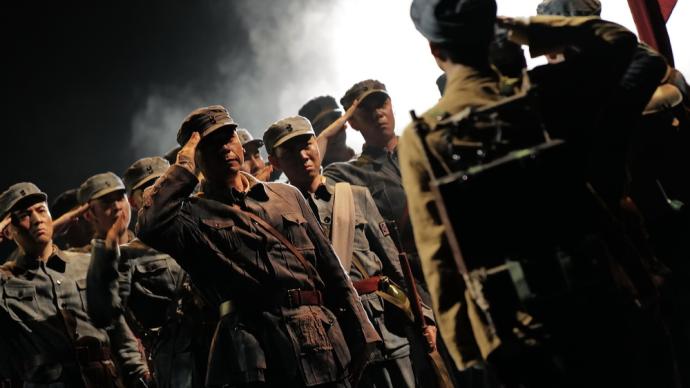
On April 13, the newly created drama "Iron Flow Eastward" premiered at the Beijing National Theater Theater, which also opened the curtain of the 7th Chinese Original Drama Invitational Exhibition. "
Build a monument for the martyrs, and build a biography for the people", the drama "Tie Liu Dong Jin" is adapted from the novel "The Last Radio" by Ji Yu, a winner of the People's Literature Award, focusing on the fighting life of the New Fourth Army's signal soldiers during the National Anti-Japanese War. The performance lineup created a group of iron soldiers.
This passionate and masculine drama is co-created by screenwriters Cha Wenbai, Zhong Ming, director Cha Wenhao, stage designer Zhang Wu, lighting designer Huang Yi and other main creators, actors Hou Yansong, Tian Zheng, Wang Ting, Chu Shuanzhong, Zhang Zhenyuan, Wang Qihan, Li Mengnan, etc. formed the "Three Iron Troops" on the stage.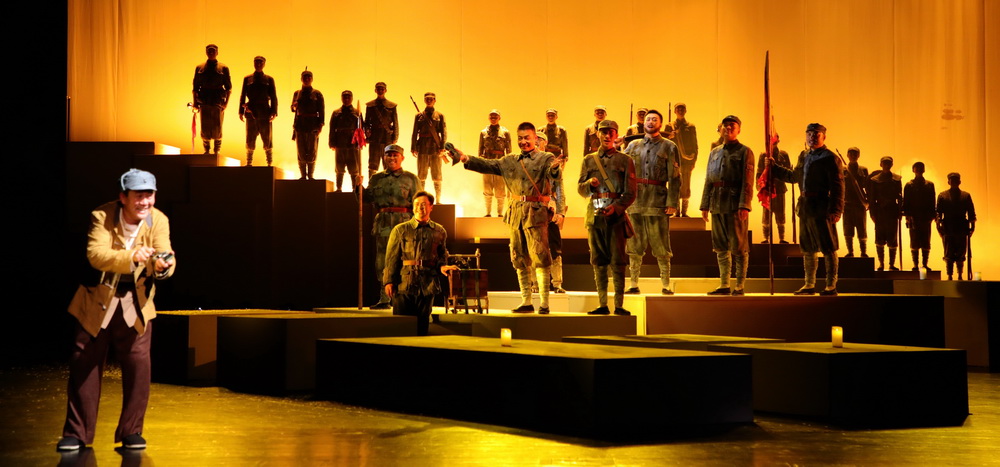
On the evening of April 13, after careful and meticulous epidemic security checks, the audience who walked into the theater looked at the stage, and the first thing they saw was not the heavy curtain that was tightly closed before the performance, but a huge projection scrim - made by The Morse code with the combination of "dot" and "horizontal" characters, the keys of the old-fashioned transmitter and the host, flashed circularly on the screen like a barrage. In addition to the novelty, it is not difficult to think of the opening of the movie "The Matrix". The green characters that occupy the entire screen pour down... Undoubtedly, the main creator is using modern technological means to demonstrate the show's idea of "connecting the times". : How do the red plots in the era of wireless telegraphy enter the hearts of young audiences in the Internet era? This is undoubtedly a useful attempt.
Cha Wenhao, a young director born in 1990, came from an artistic family. His father, Cha Mingzhe, is a well-known Mandarin director. Zha Wenhao, who graduated from the directing department of China Opera and Nortel, "directs and acts well", has also appeared in many film and television dramas. In last year's hit TV series "Age of Awakening", he played Deng Zhongxia, a young man from 1915 to 1921. At that time, Cha Wenhao defined this role as "post-90s" 100 years ago, and used the state of "burning" to interpret the characters. After stepping out of the "Age of Awakening" crew and investing in the creation of the drama "Iron Flow Eastward", he obviously also made it one of the starting points for the creation of this rehearsal to let young audiences enter the theater, and then "love to watch" the red drama. .
The Morse code flashed, and the gold-plated armbands of the New Fourth Army appeared on the veil one after another, like flags extending from the long river of history. At the beginning of the establishment of the New Fourth Army, Commander Ye Ting instructed the design of the "Yuandian" - with the New Fourth Army soldiers on the march as the pattern, and the English abbreviation "N4A" of the New Fourth Army was marked on the top. N is the initial letter of English New, which means new; 4 represents the Chinese word "four"; A is the initial letter of English Army. The lower right is marked "for the 28th year of the Republic of China", that is, it was used in 1939; there is also a new armband designed by Zhuang Wuzhou of Lu Xun Art Academy after the "Southern Anhui Incident" in 1941, drawing on the original "N4A" armband version, left and right above N4A A five-pointed star is added to each of the two corners, and "1941" is marked in the middle, which symbolizes the memory of 1941 and also represents the new birth of the New Fourth Army.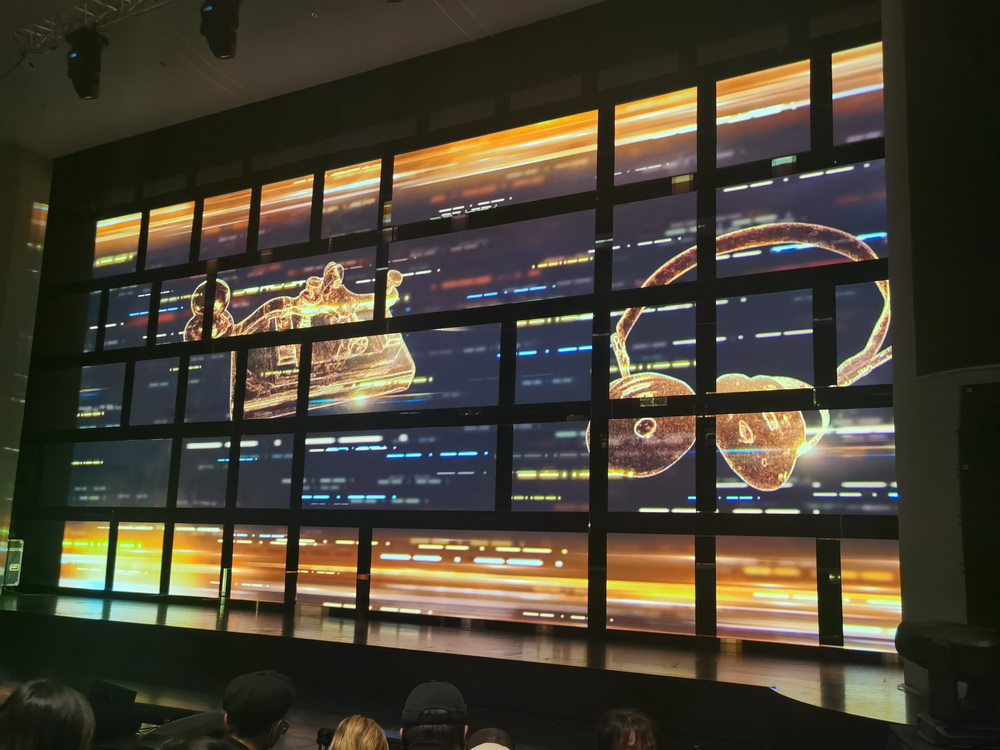
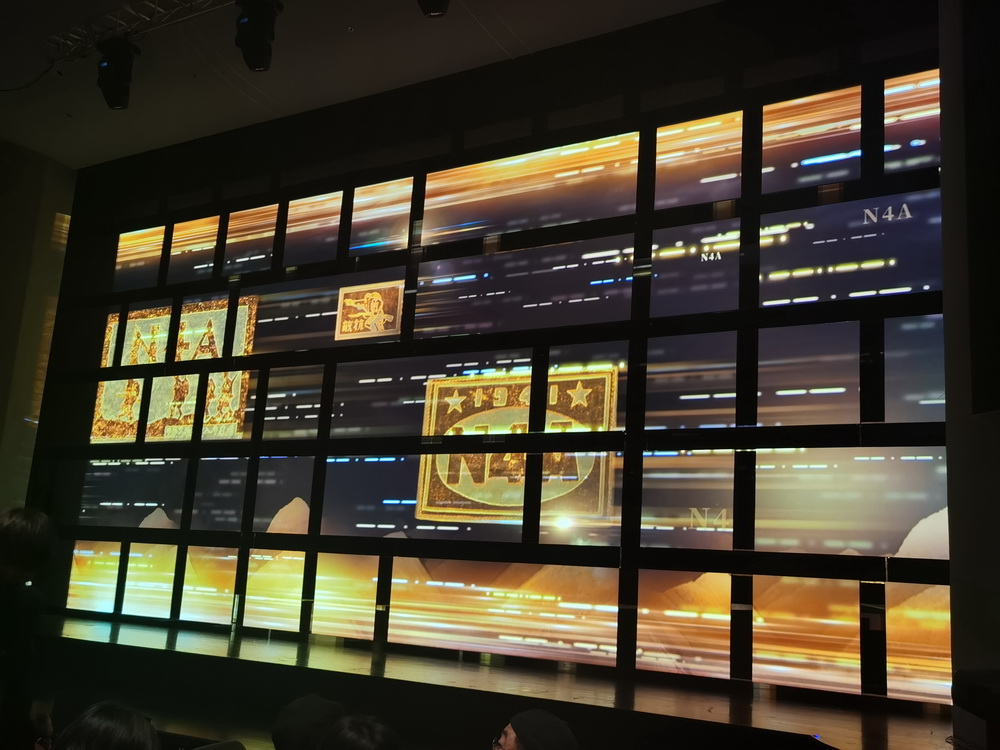
The screenwriter Cha Wenbai adopts the alternate narrative method of history and present, two time and space, unfolds the iron-blooded past of the bloody battle for the nation layer by layer, and at the same time allows contemporary people to perceive the fresh and resolute young lives in history closely. . The protagonist Li Anben's grandson's process from suspecting that his grandfather was a deserter to uncovering the hidden truth is also like Li Anben's psychological journey from ordinary to great transformation. The creator's intention is to let people in the new era witness the continuation of the iron army spirit from generation to generation.
All-round mobilization of the senses, "Allegro" live painting electric key percussion
The actors who played the warriors highly condensed the actions of fighting and sending messages, and then jumped and spun around on the stage. It is particularly worth mentioning that the soldier who plays the communication class tied a transponder similar to an allegro to his thigh, so that the action of hitting the electric key became an allegory, not only the "static" of sitting and sending a message. The action is liberated, rendering a 100,000 urgent battlefield atmosphere, and it is a historical tribute to the "Allegro", a commonly used battlefield missionary and mobilization method in the history of our army.
The turntable on the stage kept spinning, and the soldiers fell one by one amid the sound of gunfire. A barrage-like electric wave flashed through the projection, but a bright red flag remained standing. In this heroic scene, the Predator melted his flesh into a continuous stream of iron. It can be said that on the stage of the drama "Tie Liu Dong Jin", the invisible radio waves and the iron torrent of the iron army combined into a spiritual transmission material, and the patriotic enthusiasm and national feelings were quickly ignited.
Director Cha Wenhao is full of poetic and romantic imagination, using images, lighting, music, actors and other carriers to present the form of radio waves three-dimensionally, mobilizing the senses of the audience. The white matrices of different heights on the stage are arranged in Morse code symbols, and the distances representing dots, strokes, and pauses form a maze. When the lights change, it suddenly becomes a battlefield full of smoke... Soldiers are in this Morse. On the "mountain" composed of telegrams, waiting to break through, holding on to hope. The scrim above the stage is also composed of Morse code symbols. With the movement of the turntable, the image moves on the scrim, as if the ticking rhythm of telegrams, creating a romantic and poetic image.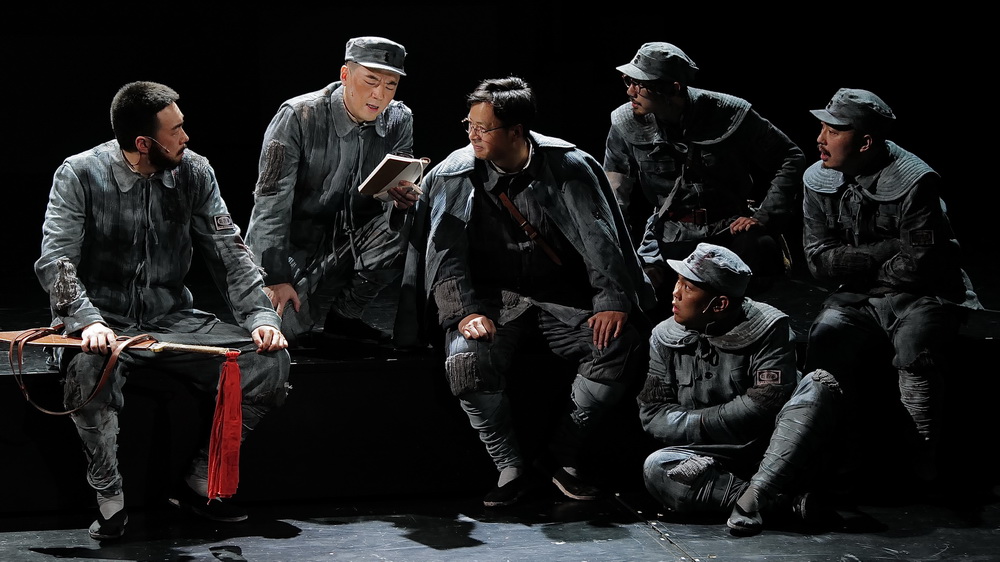
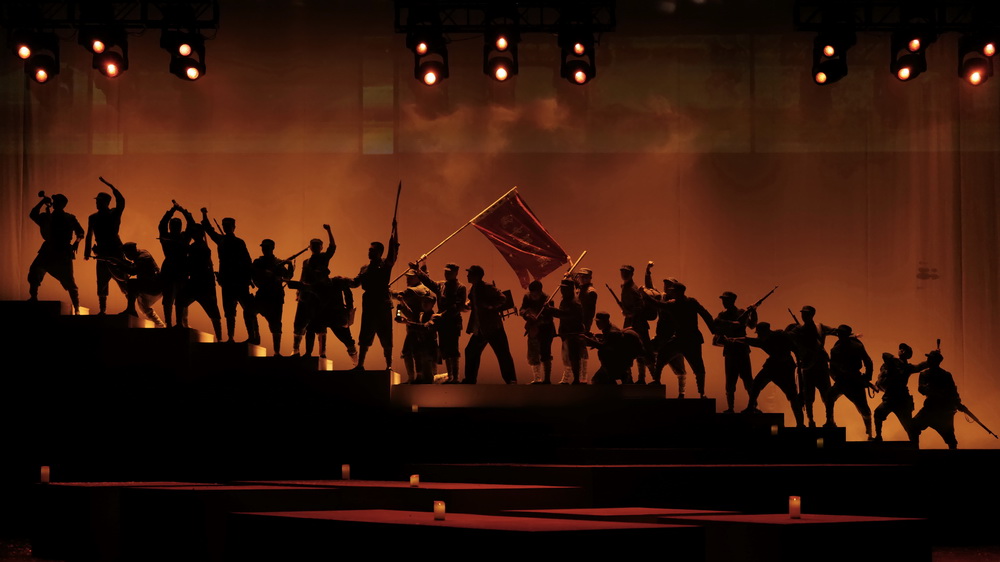
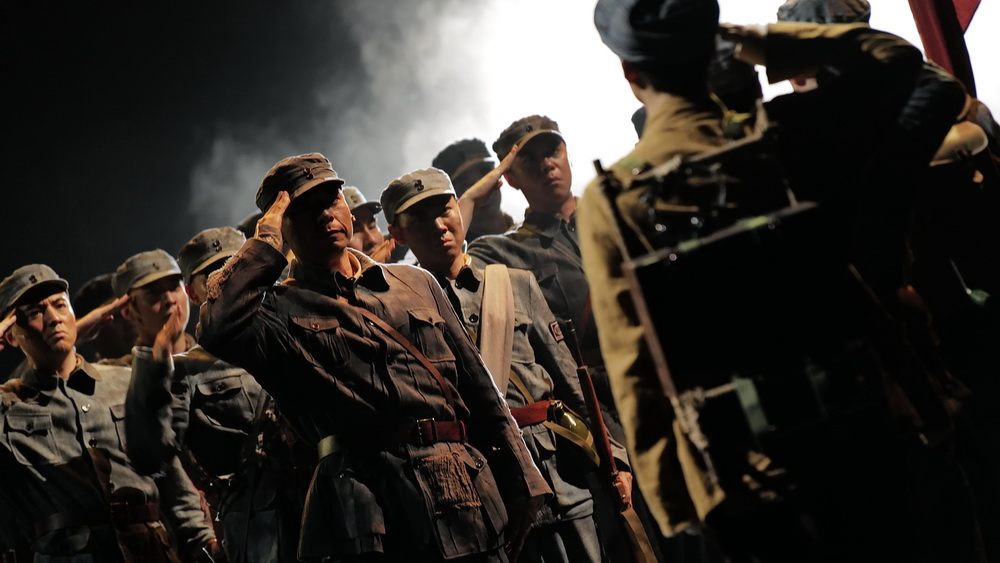
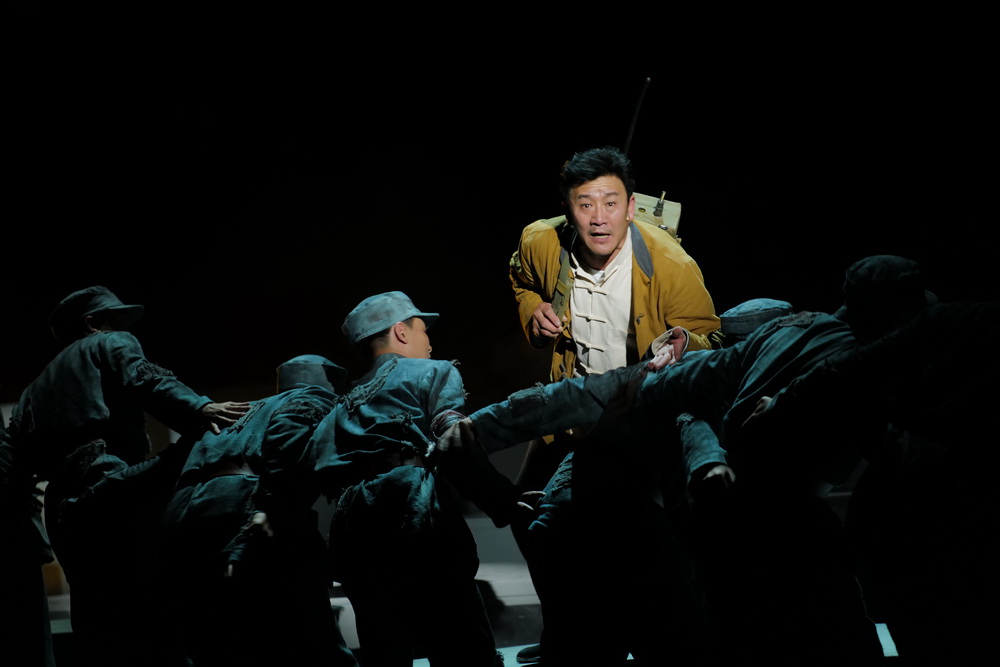
In order to show the corporal of our army, the two bamboo poles imitated the scene of "guest" Li Anben when his legs and feet were inconvenient, and the soldiers used a simple sedan chair to carry him to march. In this way, Peking Opera routines such as climbing mountains and crossing rivers also naturally appear on the stage. The actor Hou Yansong, who plays Li Anben, seems to be not satisfied with his performance. I saw him jumping on the bamboo pole and performing a trick like the northern folk custom "walking on stilts", which not only relaxed the rhythm of the plot in a timely manner, but also adjusted the audience's psychology of watching the drama. Tension, seriousness, liveliness" barracks culture.
Arouse the resonance of the times and say "this prosperous world is as you wish"
As an overall interpretation, the play "Tie Liu Dong Jin" concretizes the shape of the radio waves into a circle, which is integrated with the rotating stage, poetically shows the relationship between the radio waves and the iron army, and also adds Morse code to the music melody. elements, with male vocal chorus and humming throughout the entire song. This ticking sound is also the lingering sound of the elderly Li Anben who suffers from Alzheimer's disease in his mind, and he incorporates soft and touching brushstrokes into the grand Anti-Japanese War works...
Here you may as well explain a few characters of the protagonist Li Anben. He was originally a radio student in the Kuomintang Qingpu special training class, and he joined the national army to participate in the Nanjing defense battle. The tragic death of his comrades and relatives made him depressed for a time, and then he was willing to live in the telegraph office in his home county, living a small life of "wife and children hot on the kang head". In times of peace, such a life choice is understandable, but it is not appropriate in the life-and-death juncture of the national war of resistance and the survival of the nation. After being "hijacked" by Peng Dadao, a soldier of the New Fourth Army, he went up the mountain, and he greeted everyone as "senior officer", obviously not understanding the political work principle of our army's "unity of officers and soldiers". It is understandable that the chief officer of the New Fourth Army became an ironic "Four Master" in his mouth.
With his old-fashioned military thinking, Li Anben either looked down on the rude food of the New Fourth Army at first, and even coveted the golden pen of the patriotic returning overseas Chinese soldiers as an "equivalent exchange" for his revolutionary work. Hou Yansong painted his "soldier" side with the ugly hands, eyes, body and footwork in operas. It is understood that he used his opera skills in shaping the character of Li Anben this time, so there was the scene in the previous article: the process of Li Anben teaching the soldiers to send a report was arranged into a lively "little car play". Applaud.
The contemporary interpretation of revolutionary historical themes, in addition to relying on the stage skills of the old actors, is also impressive with the dedication of young actors. Actor Wang Qihan, who played Li Anben's grandson, compiled his lines into rap, so there was a scene where Li Anben sat on the sliders carried by the soldiers and sang and recited the Morse code formula. And he asked several times in the play, such as "Since grandpa is an old Red Army, why is there no retirement treatment?" No doubt it also brought out the "instinct" value orientation of many young people today when they encounter problems.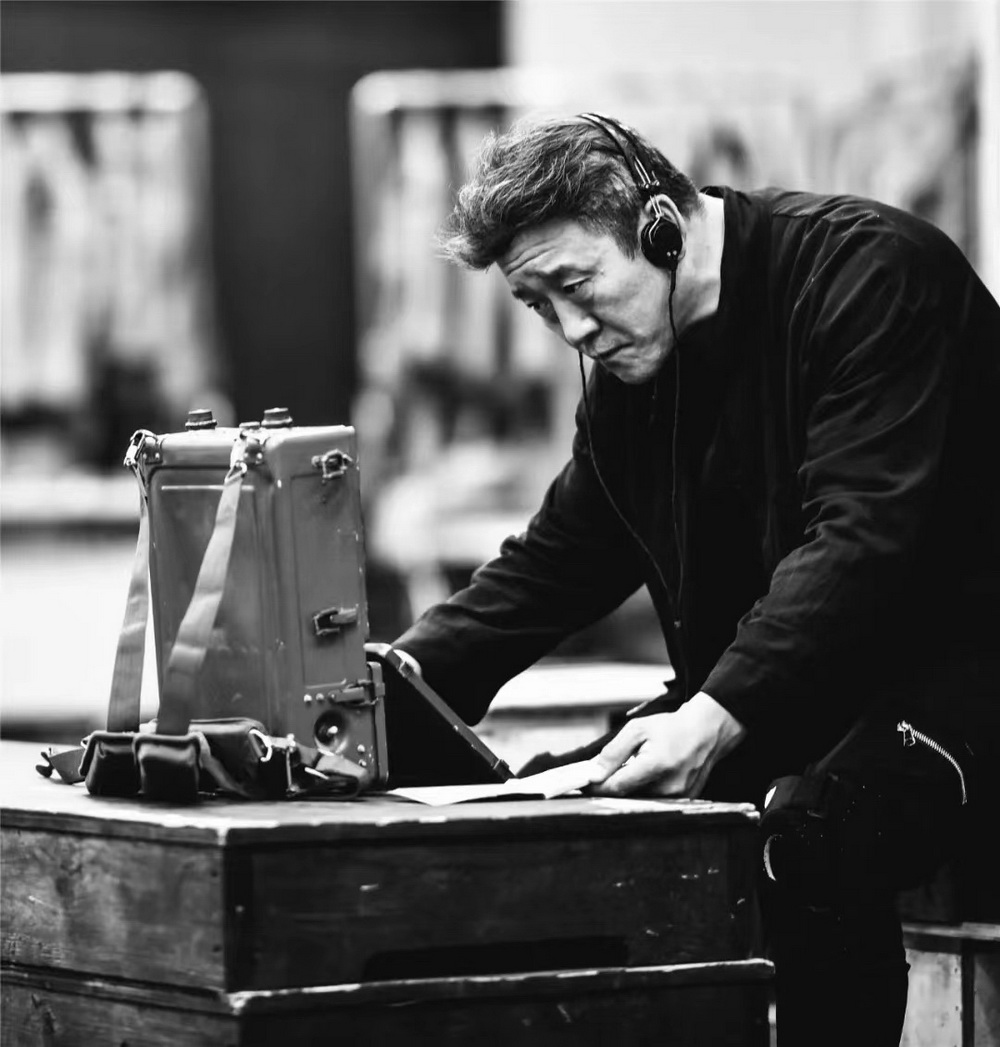
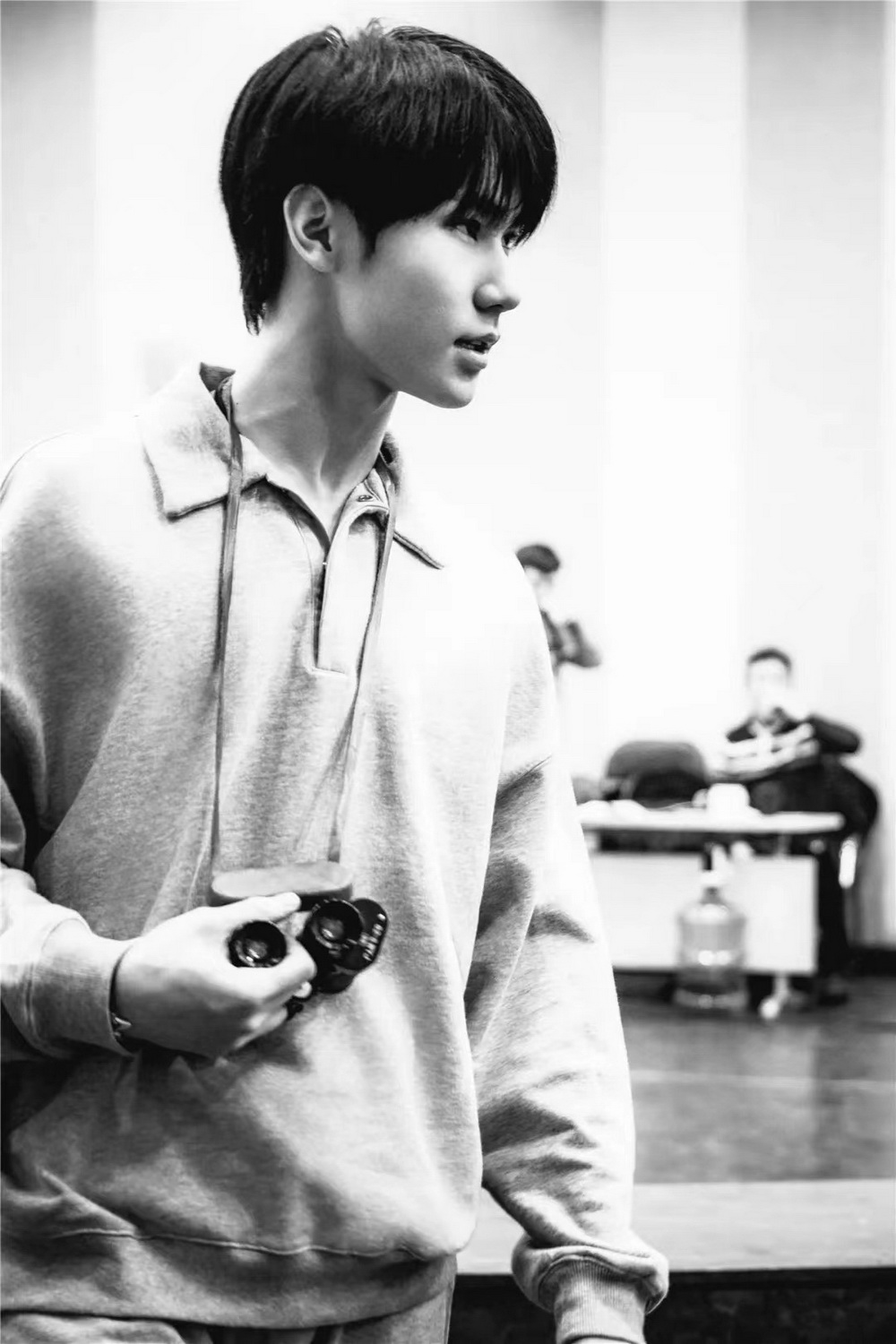
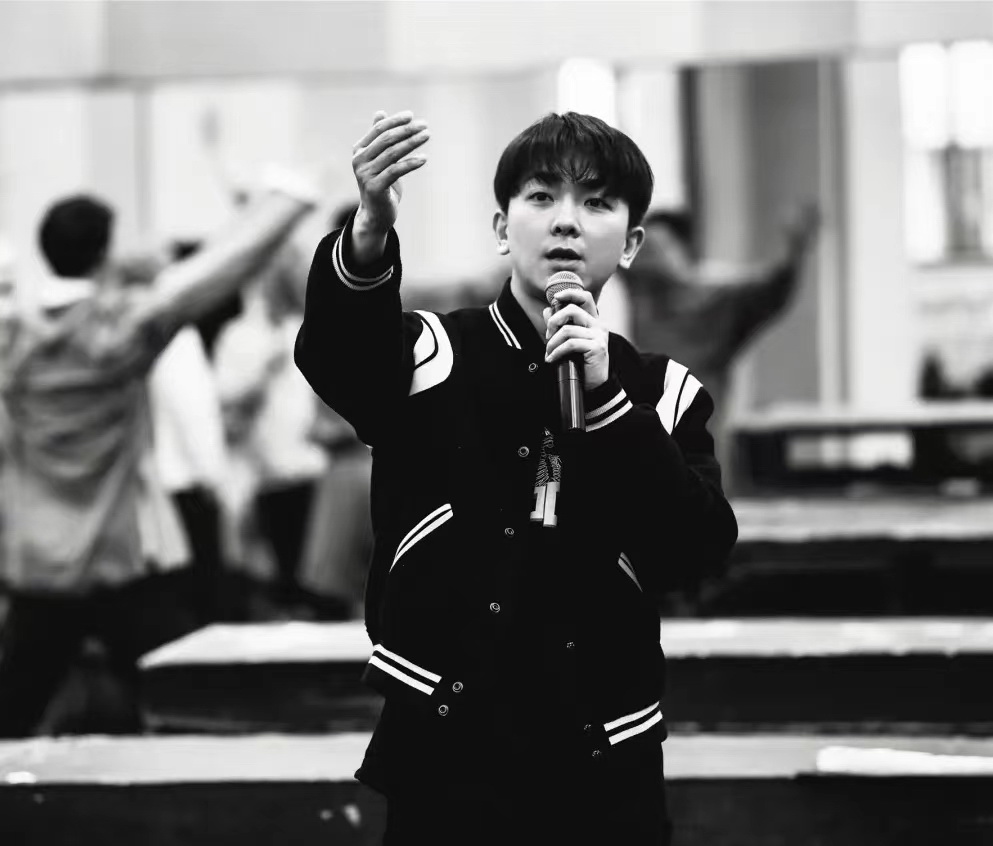
The drama "Iron Flow Eastward" uses a decrypted beginning to lead to a wonderful plot of ups and downs, and injects the characters' vivid and full personality and humorous and intelligent lines, as if there is a hidden river and lake behind each character. And it is precisely with the correct attitude of telling a good story first, and then conveying the spirit, at the end of the play, Li Anben told his comrades in the blank message that he had always wanted to send out, "I want to live well for you. This prosperous world is as you wish!" It really touched all the audience present.
Build a monument for the martyrs, and build a biography for the people", the drama "Tie Liu Dong Jin" is adapted from the novel "The Last Radio" by Ji Yu, a winner of the People's Literature Award, focusing on the fighting life of the New Fourth Army's signal soldiers during the National Anti-Japanese War. The performance lineup created a group of iron soldiers.
This passionate and masculine drama is co-created by screenwriters Cha Wenbai, Zhong Ming, director Cha Wenhao, stage designer Zhang Wu, lighting designer Huang Yi and other main creators, actors Hou Yansong, Tian Zheng, Wang Ting, Chu Shuanzhong, Zhang Zhenyuan, Wang Qihan, Li Mengnan, etc. formed the "Three Iron Troops" on the stage.

Stills of "Iron Flow Eastward" by Wang Haochen
"Era Convergence", the red drama enters the hearts of young audiencesOn the evening of April 13, after careful and meticulous epidemic security checks, the audience who walked into the theater looked at the stage, and the first thing they saw was not the heavy curtain that was tightly closed before the performance, but a huge projection scrim - made by The Morse code with the combination of "dot" and "horizontal" characters, the keys of the old-fashioned transmitter and the host, flashed circularly on the screen like a barrage. In addition to the novelty, it is not difficult to think of the opening of the movie "The Matrix". The green characters that occupy the entire screen pour down... Undoubtedly, the main creator is using modern technological means to demonstrate the show's idea of "connecting the times". : How do the red plots in the era of wireless telegraphy enter the hearts of young audiences in the Internet era? This is undoubtedly a useful attempt.
Cha Wenhao, a young director born in 1990, came from an artistic family. His father, Cha Mingzhe, is a well-known Mandarin director. Zha Wenhao, who graduated from the directing department of China Opera and Nortel, "directs and acts well", has also appeared in many film and television dramas. In last year's hit TV series "Age of Awakening", he played Deng Zhongxia, a young man from 1915 to 1921. At that time, Cha Wenhao defined this role as "post-90s" 100 years ago, and used the state of "burning" to interpret the characters. After stepping out of the "Age of Awakening" crew and investing in the creation of the drama "Iron Flow Eastward", he obviously also made it one of the starting points for the creation of this rehearsal to let young audiences enter the theater, and then "love to watch" the red drama. .
The Morse code flashed, and the gold-plated armbands of the New Fourth Army appeared on the veil one after another, like flags extending from the long river of history. At the beginning of the establishment of the New Fourth Army, Commander Ye Ting instructed the design of the "Yuandian" - with the New Fourth Army soldiers on the march as the pattern, and the English abbreviation "N4A" of the New Fourth Army was marked on the top. N is the initial letter of English New, which means new; 4 represents the Chinese word "four"; A is the initial letter of English Army. The lower right is marked "for the 28th year of the Republic of China", that is, it was used in 1939; there is also a new armband designed by Zhuang Wuzhou of Lu Xun Art Academy after the "Southern Anhui Incident" in 1941, drawing on the original "N4A" armband version, left and right above N4A A five-pointed star is added to each of the two corners, and "1941" is marked in the middle, which symbolizes the memory of 1941 and also represents the new birth of the New Fourth Army.

Morse code and old-fashioned transmitter Wang Zhengtu, the surging news reporter

The armbands of the New Fourth Army at different historical stages Wang Zhengtu, a journalist
And by the name of the play, "Tie Liu" undoubtedly refers to the New Fourth Army, which is known as the "Iron Army"; "East Advance" refers to the New Fourth Army's strategic policy of "fighting eastward and developing northward" during the Anti-Japanese War. , the epitome of guerrilla warfare behind enemy lines in the eight provinces in the south of the Yangtze River. Look at the plot in this way: "There are two ways for a soldier to leave the battlefield, triumph or sacrifice. He is the third type, alive." The grandfather who suffers from Alzheimer's disease in the play "Iron Flow East" suddenly muttered one day. Muttered "I am a martyr". The grandson revealed the mystery of his identity through the words and deeds of his grandfather. In 1941, the third regiment of the Independent Division of Central Anhui Province was blocked from advancing eastward and was besieged by Japanese invaders in Baima Mountain. It was urgent to restore contact with his superiors through radio. The dispatcher who assisted the third regiment was Li Anben, a common man with superb skills, but had no faith in the victory against Japan.The screenwriter Cha Wenbai adopts the alternate narrative method of history and present, two time and space, unfolds the iron-blooded past of the bloody battle for the nation layer by layer, and at the same time allows contemporary people to perceive the fresh and resolute young lives in history closely. . The protagonist Li Anben's grandson's process from suspecting that his grandfather was a deserter to uncovering the hidden truth is also like Li Anben's psychological journey from ordinary to great transformation. The creator's intention is to let people in the new era witness the continuation of the iron army spirit from generation to generation.
All-round mobilization of the senses, "Allegro" live painting electric key percussion
The actors who played the warriors highly condensed the actions of fighting and sending messages, and then jumped and spun around on the stage. It is particularly worth mentioning that the soldier who plays the communication class tied a transponder similar to an allegro to his thigh, so that the action of hitting the electric key became an allegory, not only the "static" of sitting and sending a message. The action is liberated, rendering a 100,000 urgent battlefield atmosphere, and it is a historical tribute to the "Allegro", a commonly used battlefield missionary and mobilization method in the history of our army.
The turntable on the stage kept spinning, and the soldiers fell one by one amid the sound of gunfire. A barrage-like electric wave flashed through the projection, but a bright red flag remained standing. In this heroic scene, the Predator melted his flesh into a continuous stream of iron. It can be said that on the stage of the drama "Tie Liu Dong Jin", the invisible radio waves and the iron torrent of the iron army combined into a spiritual transmission material, and the patriotic enthusiasm and national feelings were quickly ignited.
Director Cha Wenhao is full of poetic and romantic imagination, using images, lighting, music, actors and other carriers to present the form of radio waves three-dimensionally, mobilizing the senses of the audience. The white matrices of different heights on the stage are arranged in Morse code symbols, and the distances representing dots, strokes, and pauses form a maze. When the lights change, it suddenly becomes a battlefield full of smoke... Soldiers are in this Morse. On the "mountain" composed of telegrams, waiting to break through, holding on to hope. The scrim above the stage is also composed of Morse code symbols. With the movement of the turntable, the image moves on the scrim, as if the ticking rhythm of telegrams, creating a romantic and poetic image.




Stills of "Iron Flow Eastward" Tasutu
The modern drama language on the stage does not exclude the absorption and reference of Chinese opera aesthetics "to see the truth through the virtual" and "see the truth in the false". There is a jargon in the Peking Opera world, the so-called "three or four people, thousands of troops, thousands of horses, six or seven steps, thousands of waters and thousands of mountains", the four dragon actors on the stage can virtualize a big scene like a tidal wave of people - here, it is also learned and used to show the warriors their assault and turn.In order to show the corporal of our army, the two bamboo poles imitated the scene of "guest" Li Anben when his legs and feet were inconvenient, and the soldiers used a simple sedan chair to carry him to march. In this way, Peking Opera routines such as climbing mountains and crossing rivers also naturally appear on the stage. The actor Hou Yansong, who plays Li Anben, seems to be not satisfied with his performance. I saw him jumping on the bamboo pole and performing a trick like the northern folk custom "walking on stilts", which not only relaxed the rhythm of the plot in a timely manner, but also adjusted the audience's psychology of watching the drama. Tension, seriousness, liveliness" barracks culture.
Arouse the resonance of the times and say "this prosperous world is as you wish"
As an overall interpretation, the play "Tie Liu Dong Jin" concretizes the shape of the radio waves into a circle, which is integrated with the rotating stage, poetically shows the relationship between the radio waves and the iron army, and also adds Morse code to the music melody. elements, with male vocal chorus and humming throughout the entire song. This ticking sound is also the lingering sound of the elderly Li Anben who suffers from Alzheimer's disease in his mind, and he incorporates soft and touching brushstrokes into the grand Anti-Japanese War works...
Here you may as well explain a few characters of the protagonist Li Anben. He was originally a radio student in the Kuomintang Qingpu special training class, and he joined the national army to participate in the Nanjing defense battle. The tragic death of his comrades and relatives made him depressed for a time, and then he was willing to live in the telegraph office in his home county, living a small life of "wife and children hot on the kang head". In times of peace, such a life choice is understandable, but it is not appropriate in the life-and-death juncture of the national war of resistance and the survival of the nation. After being "hijacked" by Peng Dadao, a soldier of the New Fourth Army, he went up the mountain, and he greeted everyone as "senior officer", obviously not understanding the political work principle of our army's "unity of officers and soldiers". It is understandable that the chief officer of the New Fourth Army became an ironic "Four Master" in his mouth.
With his old-fashioned military thinking, Li Anben either looked down on the rude food of the New Fourth Army at first, and even coveted the golden pen of the patriotic returning overseas Chinese soldiers as an "equivalent exchange" for his revolutionary work. Hou Yansong painted his "soldier" side with the ugly hands, eyes, body and footwork in operas. It is understood that he used his opera skills in shaping the character of Li Anben this time, so there was the scene in the previous article: the process of Li Anben teaching the soldiers to send a report was arranged into a lively "little car play". Applaud.
The contemporary interpretation of revolutionary historical themes, in addition to relying on the stage skills of the old actors, is also impressive with the dedication of young actors. Actor Wang Qihan, who played Li Anben's grandson, compiled his lines into rap, so there was a scene where Li Anben sat on the sliders carried by the soldiers and sang and recited the Morse code formula. And he asked several times in the play, such as "Since grandpa is an old Red Army, why is there no retirement treatment?" No doubt it also brought out the "instinct" value orientation of many young people today when they encounter problems.

Starring Hou Yansong in front of the transmitter

Actor Zhang Zhenyuan plays the role of "Little Firewood" in the play

Director Cha Wenhao
Here I would like to talk about the actor Zhang Zhenyuan who plays the head guard of the New Fourth Army "Little Chaihuo". This is probably also an idol boy group who is still studying in Chinese opera for the first time in the red drama in Mandarin. This time, he showed the old and spicy side of "fresh meat", his face full of dust and oil, and the way of performing in Chongqing dialect throughout the whole process, so that the audience has long forgotten his fairness and delicacy when he was sculpting under the flash-it was not the curtain call stage of the performance. Fans who entered the theater shouted the idol's name, you really don't know that he has such a big appeal among the young group. "To eat vegetables, you must eat cabbage hearts, and when you are a soldier, you must be the New Fourth Army", which originated from the song "cabbage heart", which mobilized young people to join the army during the Anti-Japanese War. In the same way, no matter what the actor's background is, without the spirit of "one vegetable", it is impossible to integrate into the team and make a good show together.The drama "Iron Flow Eastward" uses a decrypted beginning to lead to a wonderful plot of ups and downs, and injects the characters' vivid and full personality and humorous and intelligent lines, as if there is a hidden river and lake behind each character. And it is precisely with the correct attitude of telling a good story first, and then conveying the spirit, at the end of the play, Li Anben told his comrades in the blank message that he had always wanted to send out, "I want to live well for you. This prosperous world is as you wish!" It really touched all the audience present.
Related Posts